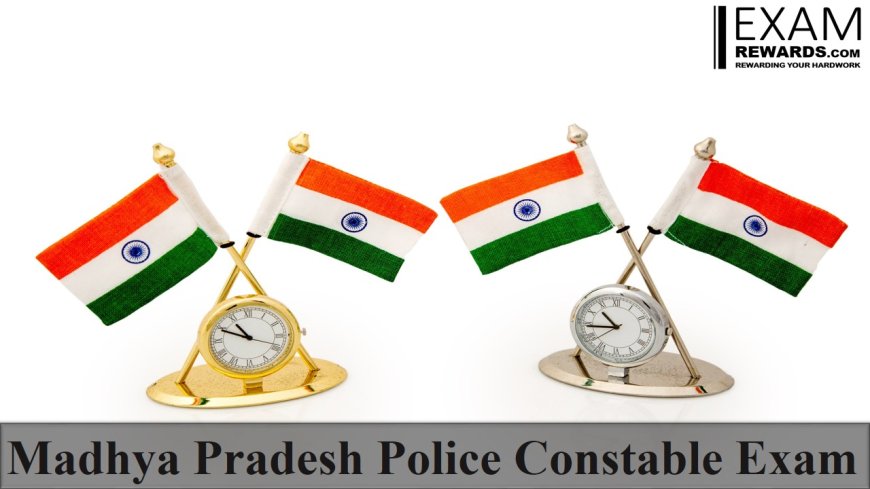Madhya Pradesh Police Constable Exam
Video Lectures Notes Mock Tests
Madhya Pradesh Police Constable Exam
TABLE OF CONTENT
1. OVERVIEW
2. ABOUT EXAM
3. ELIGIBITY
4. HOW TO FILL EXAM FORM
5. SELECTION PROCESS
6. SYLLABUS
1. Key Sections of the Exam
2. Preparation Tips
OVERVIEW
|
Exam Name |
Madhya Pradesh Police Constable Exam |
|
Number of vacancies |
7411 |
|
Education Qualifications |
Candidates should have passed at least 10th (Matriculation) or equivalent from a recognized board or institution. |
|
Age limit |
The minimum age for candidates is usually 18 years. The maximum age limit varies based on the category you belong to. It is typically around 25-28 years for general category candidates. However, there may be relaxations for candidates belonging to reserved categories such as SC/ST/OBC. |
|
Registration Date |
08th August 2023. |
|
Mod of Application |
Online |
|
Mod of Exam |
Offline (Pen & Paper) |
|
Official Notification PDF |
https://esb.mp.gov.in/advertisement/ADV_2023/PCRT_2023_AVDT.jpg |
|
Application Link |
|
|
Admit card Link |
|
|
Result Link |
https://esb.mp.gov.in/tacs/tac_2023/PCRT_TAC23/default_tac.htm |
Becoming a police constable is a noble and challenging endeavor that requires dedication, preparation, and a solid understanding of the required knowledge and skills. The Madhya Pradesh Police Constable Exam is a gateway to joining the esteemed police force in the state. To ensure your success, it's imperative to have a clear strategy and a thorough understanding of the exam's structure, syllabus, and preparation techniques. In this comprehensive guide, we'll walk you through everything you need to know to master the MP Police Constable Exam. For additional insights, refer to the complete article offered by https://examrewards.com
IMPORTANT DATES
Application starts from: 26 JUNE 2023
Last Date of Filling: 10 JULY 2023
Admit Card: 8 AUGUST 2023
Exam Date – 12 AUGUST 2023 ONWARD
ELIGIBILITY-
Eligibility Criteria for MP Police Constable Exam
Aspiring to join the esteemed Madhya Pradesh Police Force as a constable is an honorable pursuit that requires meeting specific eligibility requirements. These criteria, set by the Madhya Pradesh Professional Examination Board (MPPEB), ensure that candidates possess the necessary attributes for the role. However, please note that these criteria may evolve from year to year. It's essential to refer to the official exam notification for the most accurate and up-to-date information before applying.
1. Age Range:
Candidates usually need to be at least 18 years of age to apply.
The maximum age limit may vary based on the applicant's category. Typically, general category candidates have a maximum age of around 25-28 years. However, relaxation provisions often apply to candidates from reserved categories like SC, ST, and OBC.
2. Educational Qualification:
A minimum educational qualification of 10th grade (Matriculation) or an equivalent qualification from a recognized educational board or institution is generally required.
3. Nationality:
Candidates must be citizens of India.
4. State Domicile:
Aspiring constables usually need to be permanent residents of Madhya Pradesh. However, there may be specific cases where domicile requirements could be relaxed, especially for candidates from special categories or under exceptional circumstances.
5. Physical Standards:
Meeting the prescribed physical standards is a vital aspect of police constable recruitment. These standards encompass various parameters such as height, chest measurements, and more. Detailed information about these standards is usually provided in the official notification.
6. Character and Antecedent:
A candidate's character and background play an essential role in the selection process. Having a clean record of character and antecedents is typically required. Depending on the requirement, candidates might need to provide a police verification certificate.
HOW TO FILL EXAM FORM
Filling out the exam form for the MP Police Constable Exam is a crucial step in the application process. It's important to carefully follow the instructions provided in the official exam notification and information brochure. Here's a general guide to help you through the process of filling out the exam form:
1. Obtain the Official Notification:
The first step is to access the official exam notification or information brochure. This document contains all the necessary details about the exam, including eligibility criteria, important dates, application process, and guidelines for filling out the form by visiting https://esb.mp.gov.in/
2. Read the Instructions:
Carefully read through the instructions and guidelines provided in the official notification. Make sure you understand the eligibility criteria, required documents, and any other prerequisites for the application.
3. Online Application:
In most cases, the application process for the MP Police Constable Exam is conducted online through the official website of the Madhya Pradesh Professional Examination Board (MPPEB) or Vyapam.
4. Registration:
Visit the official website and locate the application portal for the MP Police Constable Exam. Register yourself by providing the required details such as name, date of birth, email address, mobile number, etc.
5. Fill in Personal Details:
Once registered, log in to your account and complete the personal details section of the application form. Ensure that you provide accurate information as per your official documents.
6. Educational Qualifications:
Enter details of your educational qualifications, including the name of the institution, year of passing, and percentage of marks obtained.
7. Upload Documents:
Upload scanned copies of the required documents, such as your passport-sized photograph, signature, and any other documents mentioned in the official notification. Ensure that the documents meet the specified size and format requirements.
8. Payment of Application Fee:
Pay the application fee as specified in the official notification. The fee can usually be paid through online modes such as credit card, debit card, or net banking.
9. Preview and Submit:
Before submitting the application, review all the entered information to ensure its accuracy. Make any necessary corrections. Once satisfied, submit the application form.
10. Confirmation and Admit Card:
After successful submission of the application form and payment of the fee, you will receive a confirmation email or SMS. Keep this confirmation for future reference.
Admit cards for the exam, containing details about the exam date, time, venue, and other important instructions, will be available for download from the official website within the specified timeframe.
11. Application Printout:
It's a good practice to take a printout of the submitted application form for your records. This can be useful in case you need to refer to your application details in the future.
Always ensure that you follow the instructions provided in the official notification and on the official website closely. The application process can vary based on each exam cycle, so it's crucial to rely on the most accurate and up-to-date information provided by the exam conducting authority.
APPLICATION FEE:
General Category:
The application fee for candidates in the general category might be around INR 500 to INR 700.
Reserved Categories (SC/ST/OBC):
Candidates belonging to reserved categories like SC, ST, and OBC usually get a reduced fee, which could be around INR 300 to INR 400.
Please remember that these fee amounts are approximate and can vary. It's important to check the official exam notification released by the Madhya Pradesh Professional Examination Board (MPPEB) for the exact and up-to-date application fee details for the specific year you plan to apply. Always use the official payment methods and channels specified in the notification to avoid any fraudulent activities.
ABOUT EXAM-
The exam procedure for the MP Police Constable Exam involves several steps that candidates need to follow to successfully participate in the examination process. While the exact procedure can vary based on the specific year and guidelines set by the Madhya Pradesh Professional Examination Board (MPPEB), here's a general outline of the typical exam procedure:
1. Application:
Obtain the official exam notification or information brochure from the MPPEB's official website https://esb.mp.gov.in/
Read the notification carefully to understand the eligibility criteria, application dates, fee details, and other important information.
Fill out the online application form within the specified dates, providing accurate personal, educational, and contact information.
Upload necessary documents, such as photographs, signatures, and any required certificates.
2. Admit Card:
Download the admit card from the official website within the designated time frame. The admit card contains crucial details about the exam, such as the date, time, venue, and important instructions.
Ensure that all information on the admit card is correct. If you find any discrepancies, contact the exam authorities immediately for rectification.
3. Exam Day:
Arrive at the exam center well before the reporting time mentioned on the admit card.
Carry the printed copy of the admit card along with a valid photo ID (such as Aadhaar card, voter ID, or passport).
Follow the instructions provided by the invigilators and exam staff.
The exam is usually conducted in an offline mode, where candidates mark their answers on an OMR sheet using a pen.
4. Exam Format:
The MP Police Constable Exam typically consists of multiple-choice questions (MCQs).
The questions are divided into various sections, such as General Knowledge, Reasoning, Numerical Ability, Science, Computer Knowledge, and General Hindi.
The total number of questions, marks allotted, and time duration are mentioned in the exam notification.
5. Answering the Exam:
Read the questions carefully and mark the correct answers on the OMR sheet.
Use a black or blue ballpoint pen to mark the circles corresponding to your chosen answer options.
Manage your time well to attempt all sections and questions within the given time limit.
6. Result and Further Steps:
After the exam, MPPEB will evaluate the answer sheets.
The results will be published on the official website, indicating whether you have qualified for the next stages of the selection process.
7. Physical Efficiency Test (PET) and Physical Standard Test (PST):
Qualified candidates are typically called for the PET and PST rounds, which assess physical fitness and standards.
This stage includes tasks like running, long jump, high jump, and measurements of physical standards.
8. Document Verification and Final Selection:
Candidates who clear all the stages, including written exam, PET, and PST, are invited for document verification.
If all documents are in order and eligibility is confirmed, a final merit list is prepared based on candidates' performance.
SYLLABUS-
1. General Knowledge:
· Current Affairs (national and international)
· Indian History
· Geography (India and MP)
· Indian Polity
· Indian Economy
· General Science
· Sports and Awards
· Important Events and Dates
2. Reasoning Ability:
· Analogies
· Number Series
· Alphabet Series
· Coding-Decoding
· Blood Relations
· Direction Sense
· Puzzle and Seating Arrangement
· Syllogisms
3. Numerical Ability:
· Number System
· HCF and LCM
· Decimal and Fractions
· Percentage
· Ratio and Proportion
· Average
· Simple and Compound Interest
· Time and Distance
· Profit and Loss
4. Mental Ability:
· Logical Deduction
· Statement and Conclusion
· Statement and Assumption
· Course of Action
· Statement and Argument
· Cause and Effect
5. Science:
· Physics
· Chemistry
· Biology
· Environmental Science
6. Computer Knowledge:
· Basics of Computers
· Computer Hardware and Software
· Internet and Networking
· Computer Abbreviations
7. General Hindi:
· Vocabulary
· Grammar (tenses, verbs, sentences, etc.)
· Comprehension
· Synonyms and Antonyms
· Idioms and Phrases
Key Sections of the Exam
· General Knowledge and Reasoning: This section evaluates your general awareness, current affairs, and reasoning abilities. Focus on topics like Indian polity, history, geography, economics, science, and current events.
· Numerical Ability: Sharpen your quantitative skills in areas such as arithmetic, algebra, geometry, data interpretation, and basic mathematics.
· Mental Ability: This section assesses your logical and analytical thinking skills, including topics like analogies, coding-decoding, relationships, and series.
· Science: Brush up on your basic science knowledge, including physics, chemistry, biology, and environmental science.
· Computer Knowledge: Understand fundamental computer concepts, hardware, software, and computer applications.
· General Hindi: This section evaluates your proficiency in the Hindi language, including grammar, vocabulary, and comprehension.
Preparation Tips
Understand the Syllabus: Familiarize yourself with the exam syllabus to know what topics are covered and allocate your study time accordingly.
Create a Study Schedule: Design a study plan that covers all sections of the exam and allocates sufficient time for each subject. Consistency is key.
Study Materials: Gather relevant textbooks, online resources, and practice papers to aid your preparation.
Practice Regularly: Solve previous years' question papers and take mock tests to get accustomed to the exam pattern and improve your time management skills.
Stay Updated: Stay informed about current events, especially those related to Madhya Pradesh, national news, and international affairs.
Physical Fitness: Since the exam includes a physical efficiency test, focus on building your endurance and strength through regular exercise and training.
Revision: Regularly review what you've studied to reinforce your learning and identify areas that need more attention.
Stay Calm: Manage exam-related stress through techniques like meditation, yoga, and breathing exercises.











